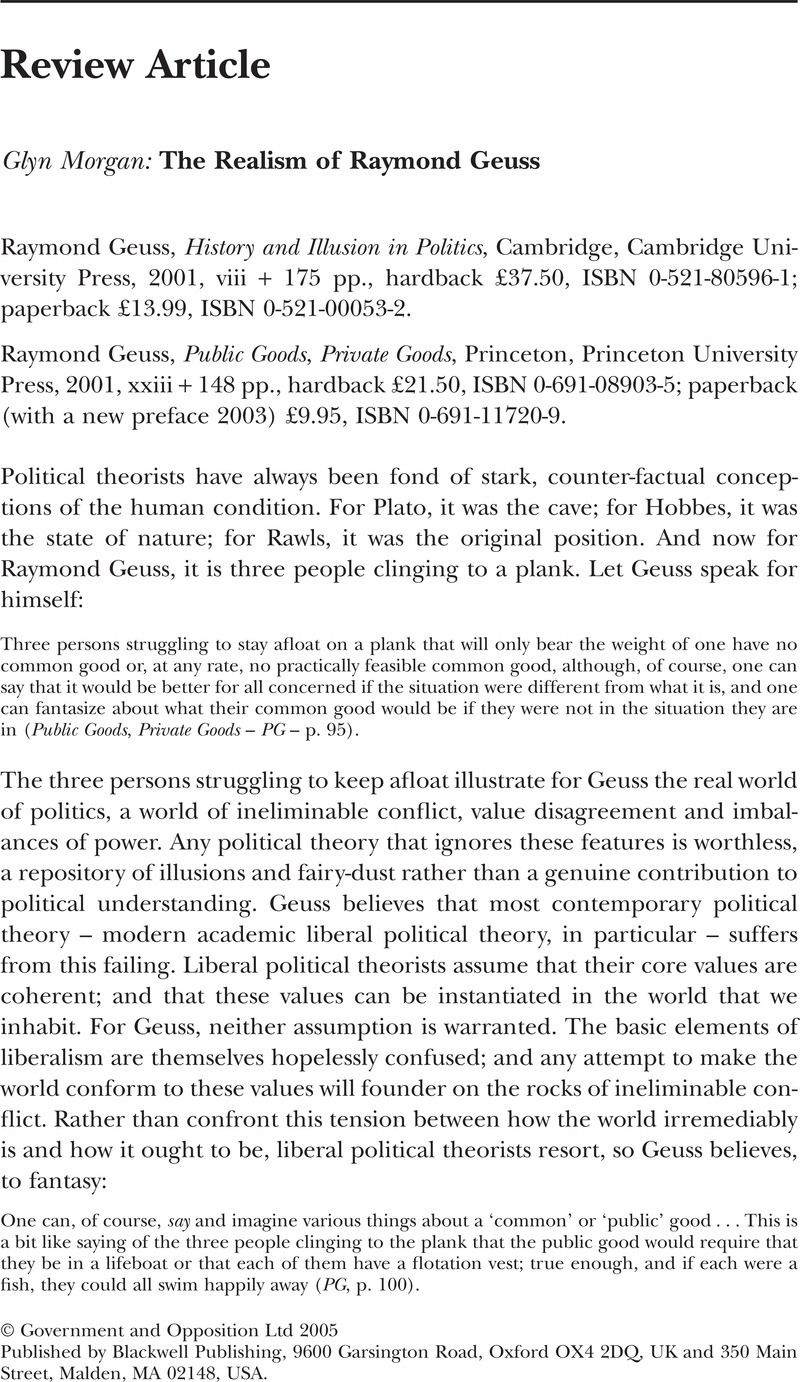Article contents
The Realism of Raymond Geuss
Published online by Cambridge University Press: 28 March 2014
Abstract

- Type
- Review Article
- Information
- Copyright
- Copyright © The Author(s) 2005.
References
1 In addition to the two books under review, these recent writings include: Raymond Geuss, ‘Liberalism and Its Discontents’, Political Theory, 30 (2002), pp. 320–38; ‘Neither History nor Praxis’, European Journal, 11 (2003), pp. 281–92; see also Geuss's contributions to Quentin Skinner et al., ‘Political Philosophy: The View from Cambridge’, Journal of Political Philosophy, 10 (2002), pp. 1–19; and his earlier collection of essays, Morality, Culture, and History, Cambridge, Cambridge University Press, 1999. Geuss's writings have attracted far less critical attention than they deserve. The most useful discussions of his work – from which I have learned a great deal – include Colin Bird, ‘Book Review: “History and Illusion in Politics” ’, Ethics, 113 (2003), pp. 879–82; and Leif Wenar, ‘Book Review, “Public Goods and Private Goods” ’, Ethics, 112 (2002), pp. 149–54.
2 For examples of realist approaches to international relations, see Hans Morgenthau, Politics among Nations, New York, Knopf, 1948; Kenneth N. Waltz, Theory of International Politics, New York, Wiley, 1979; and John J. Mearsheimer, The Tragedy of Great Power Politics, New York, Norton, 2001.
3 Ian Shapiro, Political Criticism, Berkeley and Los Angeles, University of California Press, 1990, p. 235. Rather than employing the term ‘ideational realism’, Shapiro prefers ‘critical realism’.
4 See Geuss, Morality, Culture and History, op. cit., esp. ch. 1.
5 For versions of this so-called interest theory of rights, see Joseph Raz, The Morality of Freedom, Oxford, Oxford University Press, 1986, ch. 6; and Jeremy Waldron, The Right of Private Property, Oxford, Clarendon Press, 1988, ch. 2.
6 See, for a useful compendium, Jeremy Waldron, Nonsense upon Stilts: Bentham, Burke, Marx on the Rights of Man, London, Methuen, 1988.
7 In a rather alarming comment (HIP, p. 135), Geuss notes that for thousands of years China has done ‘very nicely’ without the language of subjective rights. This suggests only that Geuss possesses a very eccentric understanding of what it is for a society to do ‘very nicely’.
8 See, for instance, John Gray, Enlightenment's Wake, London, Routledge, 1998; and Stuart Hampshire, Justice as Conflict, Princeton, Princeton University Press, 2000.
9 Thus in contrast to Gray and Hampshire, both of whom attempt to resolve conflicts on the basis of a minimal Hobbesian peace, Geuss believes that: ‘To arrive at a realistic assessment of the modern predicament, one must add to Hobbes's view a Nietzschean skepticism about “reason” ’ (PG, p. 102).
10 For a similar comment, see Wenar, ‘Book Review’, op. cit., p. 154. Geuss himself notes that he contributed a new preface to the paperback edition of PG, partly because some readers expressed ‘a certain puzzlement about … the final implications of the argument’ (PG, p. i).
11 Joseph Schumpeter, Capitalism, Socialism, and Democracy, London, Allen and Unwin, 1943.
- 1
- Cited by




